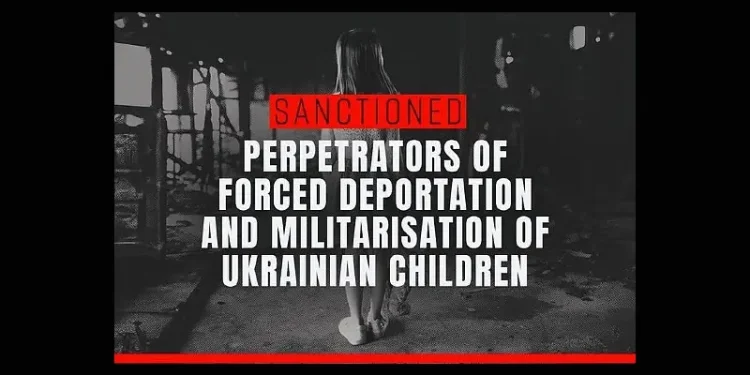Britain has sanctioned those driving the forced deportation and indoctrination of Ukrainian children. The package singles out state-linked figures and groups accused of enforcing a Russification policy in occupied territories.
On 3 September 2025, the UK sanctioned eight individuals and three organisations linked to Russia for forcibly deporting and indoctrinating Ukrainian children.
Acting through the FCDO, ministers David Lammy and Luke Pollard said the measures confront a Russification campaign in occupied territories and demand children’s return.
Who Is Targeted and Why
The designations focus on those enabling transfers of Ukrainian children and their subsequent “re-education”.
Named targets include Valery Maiorov of the state-funded “Teenage Programs Center”, Aymani Nesievna Kadyrova and the Akhmat Kadyrov Foundation, and Anastasia Pavlovna Akkuratova at Russia’s Education Ministry.
According to UK defence intelligence and UN reporting, Russian authorities have enforced a Russian curriculum in occupied areas and exposed children to militarised training.
The government argues these actions aim to erase Ukrainian identity and bind children to Russian institutions and narratives.
Officials say the package reinforces a broader policy: constrain those who organise deportations, disrupt indoctrination networks, and signal that individuals and entities involved will face asset freezes and travel restrictions under the UK’s sanctions regime.
“No child should ever be a pawn of war; we will hold those responsible to account.”
David Lammy — Foreign Secretary
How the Measures Work
- Pressure Levers: Asset freezes and travel bans on actors overseeing deportations, indoctrination, and militarised youth programmes.
- Protection Goals: Deter further transfers, support accountability efforts, and reinforce calls for the unconditional return of Ukrainian children.
The measures complement allied efforts and earlier UK actions. They aim to restrict resources, hamper recruitment into state-linked youth structures, and elevate international scrutiny.
Sanctions Package Overview
Sanctions Package Overview
| Field |
Achievement |
| Designations Announced |
11 total: 8 individuals and 3 organisations |
| Children Forcibly Transferred |
More than 19,500, per UK assessment and UN reporting |
| Re-education Camps |
Estimated 6,000 children relocated to a network of camps |
Wider Context and Next Steps
The government frames the action as part of its Plan for Change on national security and rule-of-law support for Ukraine. Moreover, ministers argue that sustained sanctions coordination with partners increases costs for those implementing Russification and reduces their access to finance and influence.
Additionally, officials highlight that the list builds on earlier UK sanctions announced in November 2024 against perpetrators of child deportations.
Therefore, today’s package broadens coverage to leaders of state-linked youth organisations and administrators within Russia’s education and propaganda infrastructure.
However, sanctions alone will not return children. Consequently, the UK continues diplomatic work with allies and international bodies to document abuses, support investigations, and press for the unconditional return of every child taken from Ukraine’s temporarily occupied territories.
To Sum Up
The UK has moved against individuals and organisations alleged to be central to the deportation and indoctrination of Ukrainian children. The designations seek to cut off resources, stigmatise involvement, and reinforce international accountability efforts.
Today’s measures escalate pressure on Russia’s network of youth and educational structures in occupied areas while aligning with allied responses.
Sources: Foreign, Commonwealth & Development Office, Luke Pollard MP and The Rt Hon David Lammy MP
Prepared by Ivan Alexander Golden, Founder of THX News™, an independent news organization delivering timely insights from global official sources. Combines AI-analyzed research with human-edited accuracy and context.









